Scarlet, vol. 1
Created by: Brian Michael Bendis and Alex Maleev
Published by: PUBLISHER
ISBN: 0785152512 Amazon
Pages: 176



First volumes are tough. Tough to gauge, tough to judge. Even with series that are well on their way and have gone some length toward establishing themselves, talking about first volumes isn't always easy. Some of my favourite books are marred by less-than-stellar, less-than-representative first volumes. Fables' initial story had me convinced the series was very much not my thing (though it later turned out to be very much my thing). Usagi Yojimbo, for all its storied perfections, boasts a first volume that is clearly evidence of a creator trying to figure out just what it is he wants to do with his character (and even shows that he's still learning how to draw his protagonist). Cerebus's first volume is so lackluster that I haven't yet taken the time to explore any of the much-praised later stories in the series. And each of these stories' initial volume can be contextualized within the scope of the rest of the work. And while Neil Gaiman's first volume of Sandman, "Preludes and Nocturnes," ends on a high note, it stumbles substantially in its earliest chapters.
It's so much more difficult for books that only yet exist as a single, introductory volume.
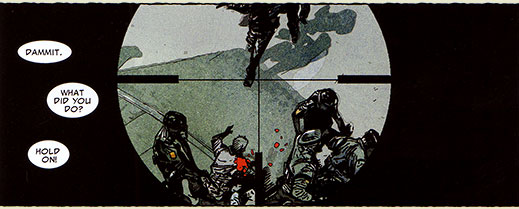
Take Scarlet for example. Author Brian Michael Bendis almost certainly has some large story planned for his new character, but in the five chapters collected in this single volume, it's impossible to tell whether that story will be any good or not. And it's not even as if this should be any sort of surprise. Most good story-driven manga series (e.g. 20th Century Boys or Death Note) take a couple volumes to win me over—and American collections of manga typically have ten chapters per volume. Translate that dynamic to the American scene (where collections typically have around six chapters per volume) and I'd perhaps be expected to know whether I'm interested in a story after three or four volumes. And that's pretty rough on these series.11Actually, it's for this precise reason that I generally wait 'til four or five volumes of a series are released before I begin pursuing it. That gives me a better chance of more accurately judging a book and it gives opportunity for word of mouth to build on whether a series is worthwhile or not.
So when I pick up the first volume of a newer series like Scarlet, it shouldn't surprise you that I really won't know what to make of it. I'm trying to think of a series whose first volume made me sit up and think, Wow, I need to read the next collection from this. I have to see where this is going! Maybe Bride's Story. Maybe Powers back in the day? Stray Bullets, Bone, Yotsuba&!, and probably a small handful of others. In any case, Scarlet is not one of these. I'm curious to see where Bendis goes with it, but not that curious. My hope is that his further work on the book will redeem volume one and that as part of the whole, it will present a seamless and wonderful story.
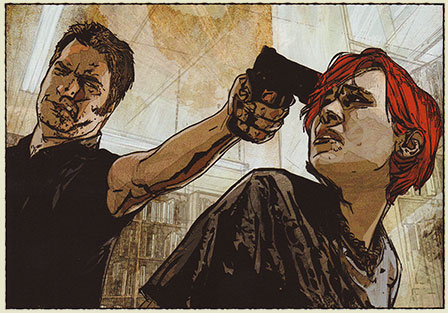
It's not as if it's in any way bad—more just that this first volume of Scarlet doesn't give much of a sense of whether this book will be worthwhile or not. Quite possibly the only way to properly judge the book is to find out how it ends. It's one of those—one of those books that will stand as a kind of political statement in one way or another.
Scarlet circles the drain of the question Just what the heck are we supposed to do with all the police corruption that is all over YouTube and Reddit, like, every day? The titular Scarlet, a young twenty-something Portland native, has her own solution and it is violent. And maybe even revolutionary. For reasons this volume lays out pretty early on, Scarlet has taken to executing corrupt cops. Bendis may keep things on that path or—and it seems this might be his tack—take things to other whole levels Tyler Durden–style. We'll just have to wait to see.
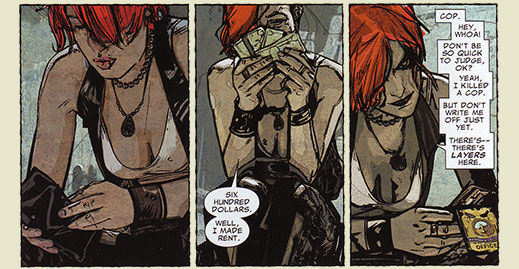
And that is why it's so hard to figure out what this series is going to be. Good? Bad? Trite? Revolutionary? Cliche? If Bendis goes full-blown political and tries to say something with the book, we'll have to wait for that thing to be said before we can judge how well he said it. It's entirely possible that he's only using the veneer of the political to give a fascinating backdrop to a straightforward story of revenge or psychosis or—who knows?—science fiction. And if he holds the fort down competently, it won't be until everything works out that we'll be able to judge whether his straightforward whatever-this-is completes admirably or otherwise.
I guess the point is: whatever Bendis intends to do with the title in the future, he is so far holding down the fort. Scarlet is thus far neither spectacular nor failure. Bendis' writing is about what one might expect from one of his books. Scarlet is written in his signature style, self-referential, somewhat witty, somewhat approximating natural speech patterns, and flipping in and out of linear narrative. Maleev's art is again what fans will expect. In terms of evolution from his tenure working with Bendis on Daredevil (what, ten years ago?), I'm sure there's some growth but it's not obvious at a glance. If you liked him on Daredevil, you very well may like him on Scarlet. The style's pretty much the same use of drawn-over-and-shopped live actors. It doesn't work for every book, but I think it might be fine here.
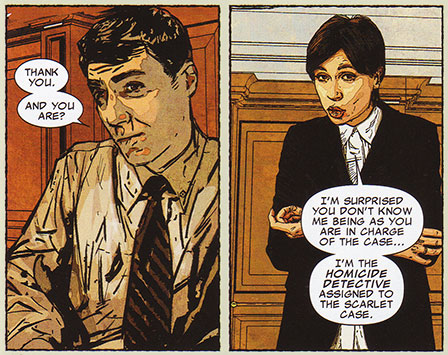 See, the art's cool until you get to everyday things like conversations. These will almost always look uncanny valley kinds of weird.
See, the art's cool until you get to everyday things like conversations. These will almost always look uncanny valley kinds of weird.
Beyond the probably unhelpful wait-and-see critique, the one thing that bothered me was Scarlet's "costume" on the volume's cover and on several chapter covers. She sports what looks like an impractical leather, zipper-fronted bandeau with a patched X on one breast and a patched O on the other.22In truth, they may not be patches. Maybe it's that craft-lovers' coloured duct tape? Maybe they're band-aids? Who knows? THE SHADOW KNOWS. Scarlet never wears any approximation of this outfit throughout the book, so I'm not sure of their prominence on the covers. I will be perfectly happy if Scarlet never adopts a uniform for her business—as the whole idea of a costume in this situation seems a little silly—but it seems as if the creative team may be angling toward this direction. It's a silly kind of costume and I would prefer it remain only on covers—actually, it may serve as some interesting sort of commentary if it only appears on the covers.
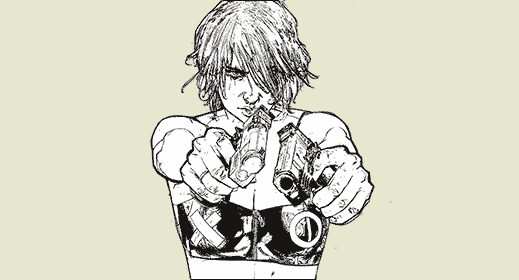
Good Ok Bad features reviews of comics, graphic novels, manga, et cetera using a rare and auspicious three-star rating system. Point systems are notoriously fiddly, so here it's been pared down to three simple possibilities:
3 Stars = Good
2 Stars = Ok
1 Star = Bad
I am Seth T. Hahne and these are my reviews.
Browse Reviews By
Other Features
- Best Books of the Year:
- Top 50 of 2024
- Top 50 of 2023
- Top 100 of 2020-22
- Top 75 of 2019
- Top 50 of 2018
- Top 75 of 2017
- Top 75 of 2016
- Top 75 of 2015
- Top 75 of 2014
- Top 35 of 2013
- Top 25 of 2012
- Top 10 of 2011
- Popular Sections:
- All-Time Top 500
- All the Boardgames I've Played
- All the Anime Series I've Seen
- All the Animated Films I've Seen
- Top 75 by Female Creators
- Kids Recommendations
- What I Read: A Reading Log
- Other Features:
- Bookclub Study Guides









